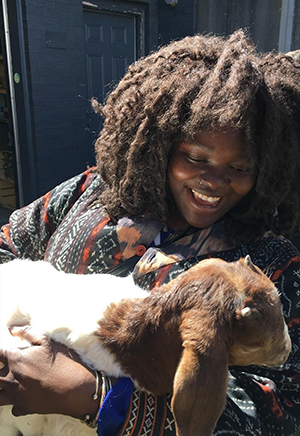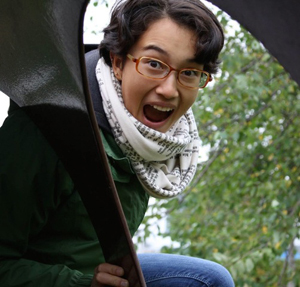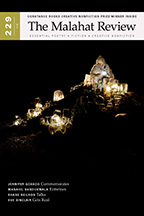Digging Into Good Soil: Holly Lam in Conversation with Francesca Ekwuyasi

Francesca Ekwuyasi, whose story "Good Soil" appears in the Malahat Review's Winter 2018 Queer Perspectives Issue, discusses the evolution of a story, the intersection of queerness and faith, and happy endings in her Q&A with Malahat Review fiction board intern Holly Lam.
Francesca Ekwuyasi is a writer and filmmaker from Lagos, Nigeria. Her work explores themes of faith, family, queerness, consumption, loneliness and belonging. You may find her writing in Winter Tangerine Review, Brittle Paper, Jalada/Transition Magazine Issue 05/123, Vol. 1 Brooklyn, and Guts Magazine. Visit her portfolio at ekwuyasi.com.
First of all, I loved your story. Your style and the language you use is so lush and rich, reading it is like digging into good soil—but it’s sparse when it needs to be, too. You give just enough detail to convey depth. What sort of evolution has this story had, to ultimately find that balance? How long have you been working on it?
Thank you very much! I'm glad to hear that you enjoyed reading it. I thoroughly enjoyed writing it, and it always feels a bit indulgent when I enjoy the process and it actually works out! I think I worked on it for about three months and a few weeks. After I wrote the first paragraph and started getting a sense of who the main character was, it became enjoyable to peel deeper into the story and reveal more about her life. It evolved from dialogue-heavy prose in which most of the plot was propelled forward through conversation, to a stripped-down version with a priority on emotional transparency with the main character and her internal conflict.
In “Good Soil,” the main character, Lucky, lives and travels all over, from her home in Lagos, to Canada, Cameroon, and the Democratic Republic of the Congo. Where were you when you wrote the story? How is the way you reflect on and write about place different when you’re there versus when you’re away?
I wrote most of it while pretending to work at my previous day job in Halifax, Nova Scotia. I have an intense longing to travel, to live elsewhere always, wanderlust. I don't imagine it's a terribly healthy trait, but the desire fuels my writing in many ways. When I'm writing about a place I haven't lived or been to in a while, I spend some time researching, looking at pictures, and chatting with people who live there. However, there's nothing quite like the visceral details one can weave into a story while writing about a particular place that you presently occupy. So my ambition is to be able to live in the areas I write about, even if it's for a few weeks or a few months, or a year.
The concept of queerness running in families, and the way queerness within a family can be ignored, suppressed, and celebrated, fascinates me, and so I was interested in Lucky’s cousin who lives in London and is openly queer. Lucky seems in awe and yet a bit wary of her. How did Precious come to be in the story?
It was important to me and the integrity of the story, actually, to make sure that despite Lucky's internalized fear and her mother's homophobia, there was a portrayal of a non-tragic queer experience. Granted, one might argue that Precious being forced to go to the village when her relationship was found out is a tad tragic, but she didn't buy into the homophobia, she remained fairly carefree. Another reason I inserted Precious' narrative into the story is that I wanted to portray an idea of queerness that I've heard many Nigerians express, which is that queerness in any form, particularly in sexual orientation and gender variability, is a foreign/white people/un-African thing. So to Lucky's mother, Precious having been born and raised in the UK and turning out queer was understandable because she had "lost" her Nigerian culture, but Lucky's queerness wasn't to be tolerated at all, because she was raised "right" and should know better.
Lucky fixates on fact and truth, yet struggles between truths within herself: her queerness and her faith, among others. You’ve written before about the intersections of these identities—in an essay in Guts, you write about trying to reconcile them in your own life. Is it possible for Lucky to make a choice between the two, or to reach some sort of reconciliation? Is that the question “Good Soil” tries to answer?
"Good Soil" is asking the same questions, yes. I don't know that it answers them at all. Much like in the essay, “Soft Jaw,” I think that seeking answers is the whole point of the story or the journey. I believe that Lucky could probably reach a sort of reconciliation, but not without sacrificing her relationship with her mother, or her relationship with Shalom, or disappointing Afolabi, or believing that in some ways she's disappointing her creator. That's the thing about dogmatic religions, or more accurately dogmatic interpretations of faith practices; it may take a lifetime to deprogram all that indoctrination.
Or, one could always just live with the tension that those contradictions tend to create in a body and a life; I think many of us do that, it makes for interesting art.
I’m struck by the role of choice in the story, and Lucky’s choices are so strong, they hold huge emotional weight. Yet at the end of the story, we don’t find out what she chooses in that very last moment. Why did you decide to end the story that way?
I ended the story without revealing Lucky's choice because although I'm a sucker for happy endings, I'm determined to challenge myself as a storyteller and grow beyond what I know and enjoy. I also don't know that revealing her choice would necessarily have mattered, because the whole point of the story is the tension between her desire to live an honest life and the desire to please her mother as well as maintain a connection to her home and her faith. I definitely don't want to downplay the importance of familial relationships, culture, or religion, so I didn't want to suggest that the "right" thing for Lucky to do would be to run off with Shalom. However, I didn't want to suggest that that would be wrong either, because it's not.

Holly Lam
* * * * * * * *









